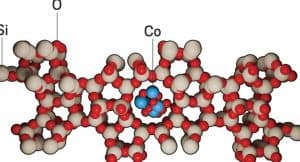
Chemical engineers at MIT have designed a cobalt catalyst that transforms polymers into propane selectively and efficiently (JACS Au, 2022, DOI: 10.1021/jacsau.2c00402). This method could provide an alternative to other proposed chemical recycling solutions that rely on more-expensive metals, such as platinum and ruthenium.
Propane makes up more than 80% of the gaseous products formed when the catalyst breaks down polymers, explains Guido Zichittella, the lead author of the study and a chemical engineer in the lab of Yuriy Román. Previous catalysts have generally broken down plastics into uneven mixtures of hydrocarbons ranging from methane to long-chain waxes. “Instead, we get almost pure propane, ideal for recycling and upcycling,” he adds. Propane is easily converted to propylene, which can then be made into new polymers or be a feedstock for other chemical processes.
In the study, researchers investigated different cobalt compounds and catalytic supports. The majority yielded a mixture of mostly methane, a greenhouse gas with relatively low value; however, cobalt supported on the zeolite ZSM-5 converted about 30% of polypropylene and 80% of polyethylene—including postconsumer polyethylene bottles—into propane. The two plastics account for over half of the plastic waste worldwide.
The reaction works under moderate temperature and hydrogen pressure, comparable to conditions reported for reactions using precious-metal catalysts. Moreover, the catalyst contains cobalt loads as low as 5% in weight, making the method relatively efficient and economical.
Preliminary results suggest the oxidation state of cobalt and the acidity and structure of the zeolite influence this unusual selectivity. X-ray absorption spectra indicate the presence of only cobalt(II), instead of a mixture of other oxidation states, which could stabilize some key reaction intermediates, the researchers say.
